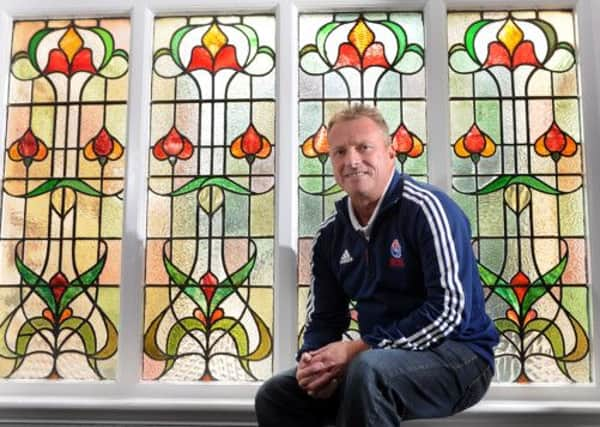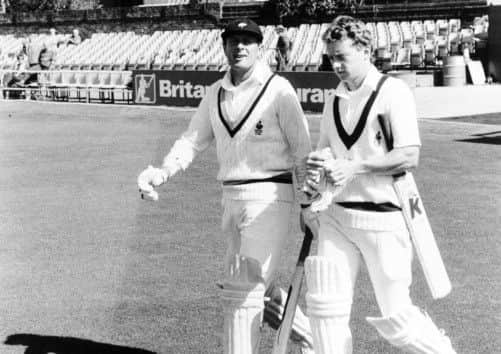Ashley Metcalfe: Yorkshire cricket star carrying weight of national expectations


The last time Great Britain came home with an Olympic medal in weightlifting was in 1984, when David Mercer of Salford brought back a Bronze medal from Los Angeles.
The man charged with bringing British Weightlifting back to the Olympic medals table and knocking the opposition for six is none other than former Yorkshire opening batsman Ashley Metcalfe. It’s a tall order given the dominance of nations such as China, Turkey and those that made up the old Soviet Union states, but there is now at least some funding available.
Advertisement
Hide AdAdvertisement
Hide AdMetcalfe’s professional playing career saw him amass 11,938 runs for Yorkshire and latterly Nottinghamshire. So how did he end up becoming the chief executive of British weightlifting?


“This role came totally out of the blue,” he says from behind his desk in the British weightlifting headquarters, based in the leafy suburb of Headingley.
“I was on a break with the family at Center Parcs earlier this year when I saw the job come up on my mobile phone through a website. It caught my imagination immediately as it offered what was pretty much a blank sheet of paper from which to grow a sport,” he says.
“I made a conscious effort when I left professional cricket to see whether I could get out into the big wide world and cut the mustard. I’ve worked in marketing and media relations and I’ve established and built small businesses that have either been sold on or swallowed up by larger companies. But in the back of my mind I always thought it would be nice to get back into the sporting environment at some stage.”
Advertisement
Hide AdAdvertisement
Hide AdBut why weightlifting? “It’s one of the traditional Olympic sports. It was one of the original seven disciplines when the Modern Olympics was reborn and judging by the reception the competitions had at last year’s London Olympics it is a sport that still has the capacity to excite the crowds.”
Apart from Precious McKenzie, who won gold medals at the Commonwealth Games in 1966, 1970, 1974 and 1978, Britain hasn’t really excelled in the sport.
But Metcalfe is a man on a mission and together with the sport’s new chairman Peter Rowley and new high performance director Tommy Yule, he hopes to shape the future of a sport that has been handed a budget of £1.8m for between now and the Rio Olympics in 2016.
“The funding we have so far will allow us to start creating the foundations for success. We presently rely, like a lot of Britain’s minority sports, on funding from Sport England, to grow participation; and from UK Sport, which is all about gearing up towards success.
Advertisement
Hide AdAdvertisement
Hide Ad“The funding will see us through to Rio and there is pressure for us to deliver there. In previous Olympics we haven’t produced but we have received the current tranches on the sport’s potential.”
That potential has largely been engendered by a creditable 12th place at the London Games by Zoe Smith, who became the first English woman to win a Commonwealth Games medal when she took Bronze in the 2010 Delhi Games.
“Lifters such as Zoe are changing the perception that the general public has about the sport. The old image was of large people taking part but Zoe and others both male and female are very slim, powerful and strong athletes. It’s all about technique, power and speed. This sport should be the first port of call for anyone who is interested in keeping themselves well toned and healthy.”
He believes it’s an exciting sport to watch. “The weightlifting arena at the London Games was sold out day after day and the sport itself fascinates me.
Advertisement
Hide AdAdvertisement
Hide Ad“You could walk past some of our top weightlifters in the high street and looking at them you might never think they would be able to lift what they do, but they are tremendously skilful and like Zoe they can out-lift much bigger opponents. That’s not something that happens in other sports.”
Metcalfe wants to bring the sport much more in the public eye. “We need to make the sport much more accessible for everyone to watch it more regularly and it would be great if we could get regular TV coverage. We needn’t be frightened of what we have to offer either because we have something that is really exciting, an explosive sport with immense passion and determination,” he says.
“I’d love to take the sport on a beach tour in the summer, taking in places like Scarborough and Blackpool – and shopping centres such as the White Rose, Trinity and Meadowhall.
“I’m not sure we will go as far as Premiership Darts but it has to become a spectacle that people want to compete in as well as come along to watch.
Advertisement
Hide AdAdvertisement
Hide Ad“The funding we have in reality gives us the opportunity to run a high performance programme on what many would regard as a shoestring budget, but at least we have it.”
Sport England wants them to grow participation figures year on year and since the London Games Metcalfe says that’s what has happened.
“There are now 100,000 lifters who lift weights at least once a week. That’s grown by 20,000 in the past 13 months but membership of British Weightlifting, the competitive side of the sport, is just 2,500. That’s a relatively small number and we need to see that grow.”
Metcalfe says he’s determined to succeed. “I have worked particularly hard at anything I have ever achieved and nothing has ever come easily.
Advertisement
Hide AdAdvertisement
Hide Ad“When I played cricket I always practiced for a considerable number of hours every week and committed myself completely. In a business environment I’ve succeeded largely because of the hours I’ve put in.
“You don’t get anything without hard work and I’m devoted to making weightlifting a British success.”
He’s hopeful this will happen in Rio, in four years time. “A medal or two would definitely increase our funding and we need to try and produce results in the short-term but we also need to put the foundations in place to build high performance for the next eight, 12 and 16 years.”
He was enticed to apply for the post not just because of his desire to be involved in competitive sport once again, but also because of the headquarters of British weightlifting being based in Leeds. Metcalfe was born in Horsforth, grew up in Baildon and has lived in Farsley for more than 30 years, during which time he made his name as a cricketer.
Advertisement
Hide AdAdvertisement
Hide AdHis finest moment came when his beloved Yorkshire won the Benson & Hedges Cup Final in 1987 and he recalls how he felt back then.
“It was an end of an era when we played. In those days you had to have been born in Yorkshire to play for the county whereas all the other counties had high quality overseas internationals playing for them. It would have been brilliant if we could have won the County Championship in those circumstances but in reality as a squad we didn’t have quite the depth and weren’t strong enough to do that when I played.
“But we won that day as 11 Yorkshiremen born and bred and it was a massive highlight for me. We had beaten some pretty good sides on the way to the final and Martyn (Moxon) and I put on just short of 100 for the first wicket, of which I scored 47 and then Jim Love got 70-odd not out.”
He hopes to enjoy similar success in his new role. “We have a terrific young Yorkshire weightlifter right now who is breaking records all the time. She’s called Rebekah Tiler and comes from Denholme. Rebekah trains at Mytholmroyd Weightlifting Club and is already the European Youth Champion at just 14.
Advertisement
Hide AdAdvertisement
Hide AdShe won the title in Lithuania this year where she won three Gold medals and has now set 27 British records. She is a phenomenal talent.”
Is it too much to dare to dream that Rebekah or Zoe could become our first Team GB Gold medal winner at the Olympics since Launceston Elliott in 1896? One thing’s for sure, Metcalfe will give as much passion and energy to the cause as he did when playing for Yorkshire.
Weightlifting in Britain
British Weightlifting was founded as its present name in 1910.
Lanceston Elliott is the only British weightlifter to ever win a gold medal at the Olympics. He did so in 1896.
Advertisement
Hide AdAdvertisement
Hide AdThe first British Weight-lifting Championships took place in 1891.
Louis Martin is viewed as the greatest British weightlifter of all time. He won four World Championship titles between 1959-1965 and medals at two Olympic Games, winning a Bronze in the 1960 Rome Games; and a Silver medal in the 1964 Tokyo Games.
Women’s Weightlifting classes were introduced into the Olympics at the Sydney Games in 2000.
There are eight male classes and seven female classes at the Olympics Games.